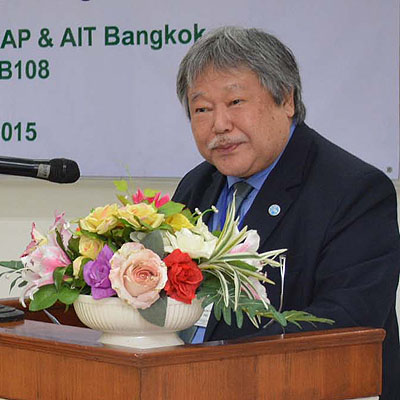Agricultural production in urban and peri-urban areas of Asia could help strengthen the future of food security and nutrition for the region’s growing urban populations, a regional meeting co-organized by FAO and the Asian Institute of Technology heard this week.
News
AIT’s Dr. Philippe Doneys co-edits new book ‘Gendered Entanglements: Re-visiting gender in rapidly changing Asia’

AIT Gender and Development Studies coordinator Asst. Prof. Philippe Doneys has co-edited a newly published book titled ‘Gendered Entanglements: Re-visiting gender in rapidly changing Asia’ – a first of its kind publication covering a wide set of contemporary issues relating to gender, with a specific Asia focus.
AIT environmental science scholars rank high on Thailand top 100 list of published authors
AIT hosts international workshop on ‘Innovative Biofloc Technologies for Disease Prevention and Shrimp Farming’ organized by AARM

Thirty participants from 14 countries are participating in a five-day workshop at AIT on ‘Innovative Biofloc Technologies for Disease Prevention and Ship Farming’. The learning event from 6-10 July 2015 is organized by the Aquaculture and Aquatic Resources Management (AARM) field of study under the AIT School of Environment, Resources and Development.
Statesmanship required on a global scale: Nobel Laureate José Ramos-Horta

After the Kyoto Protocol of 2005, the stakes at COP21 in Paris will be very high, as the aim is to reach a “universal legally binding agreement†that will enable the 195 parties to combat climate change effectively and boost the transition towards resilient, low-carbon societies and economies. Stating this, Nobel laureate (1996) and former President of Timor-Leste, José Ramos-Horta, said that “new partnerships must be built between industrialized countries and emerging economies with a view to forging a strategy to address the multi-dimensional challenges we face.â€
RDECOM, US and Thai MDRC visit AIT

US Army Research, Development and Engineering Command (RDECOM) and Thailand’s Military Research and Development Center (MRDC) visited the Asian Institute of Technology (AIT) on 26 June 2015 and sought to learn about AIT’s research expertise . Led by Rear Admiral Sahapong Kreupetch, Director General of MRDC, the team included Mr. Andy Wood from Field Assistance in Science and Technology Pacific, and Colonel Lee Dunlap Officer, RDECOM.
Paris Conference of Parties could be a turning point: Experts at RFCC

The Conference of the Parties to the United Nations Framework Convention on Climate Change, known as COP 21, could be a turning point for humanity if countries are able to achieve a new international agreement aimed at keeping global warming below 2°C. This was the sentiment of various experts, scientists, policy makers and practitioners that had assembled at the Asian Institute of Technology (AIT) for a three-day conference beginning 1 July 2015 to participate in the Regional Forum on Climate Change (RFCC) being organized jointly by AIT, French Ministry of Foreign Affairs and International Development, ASEAN Secretariat, and the European Union (EU).
Orientation Day
The detailed program of Orientation Day can be downloaded from this link.




